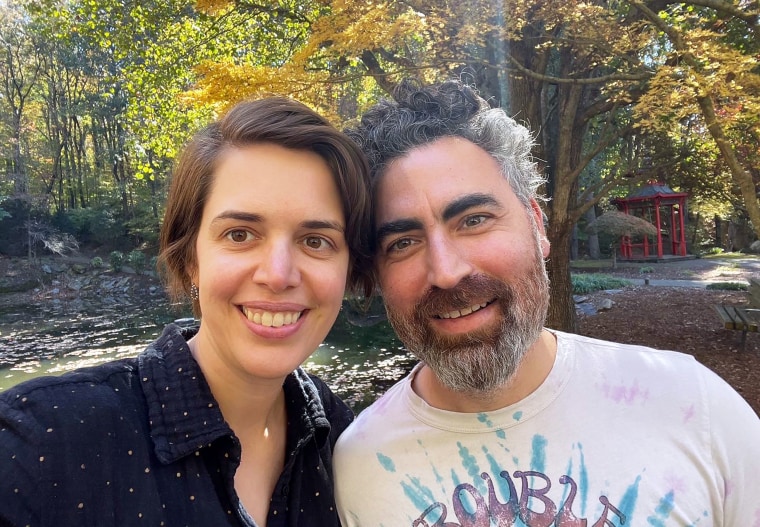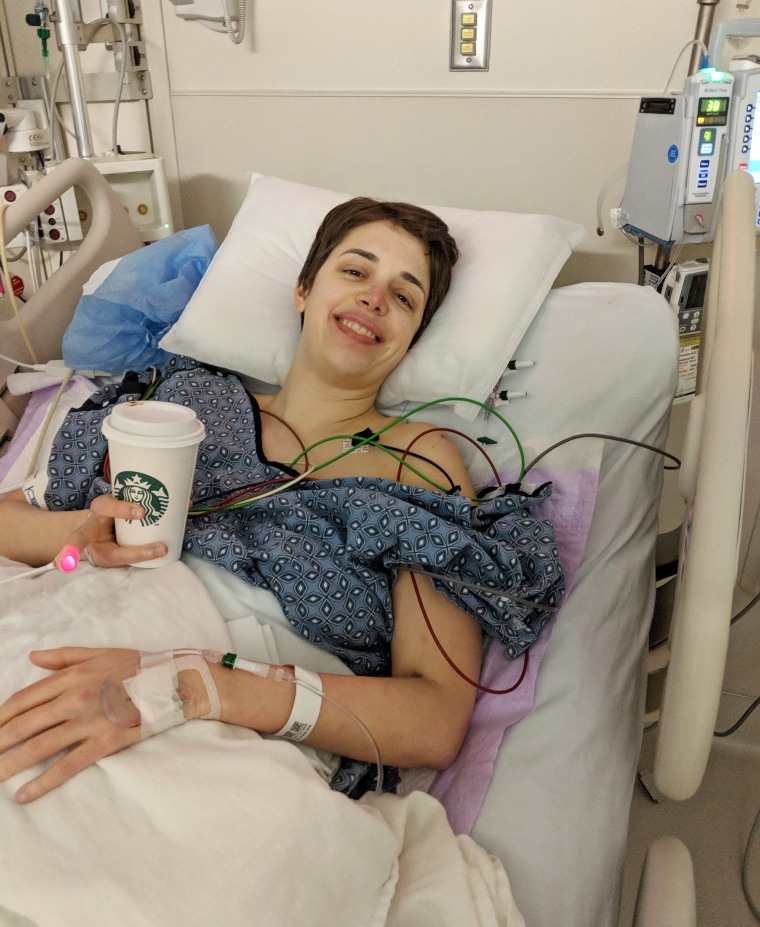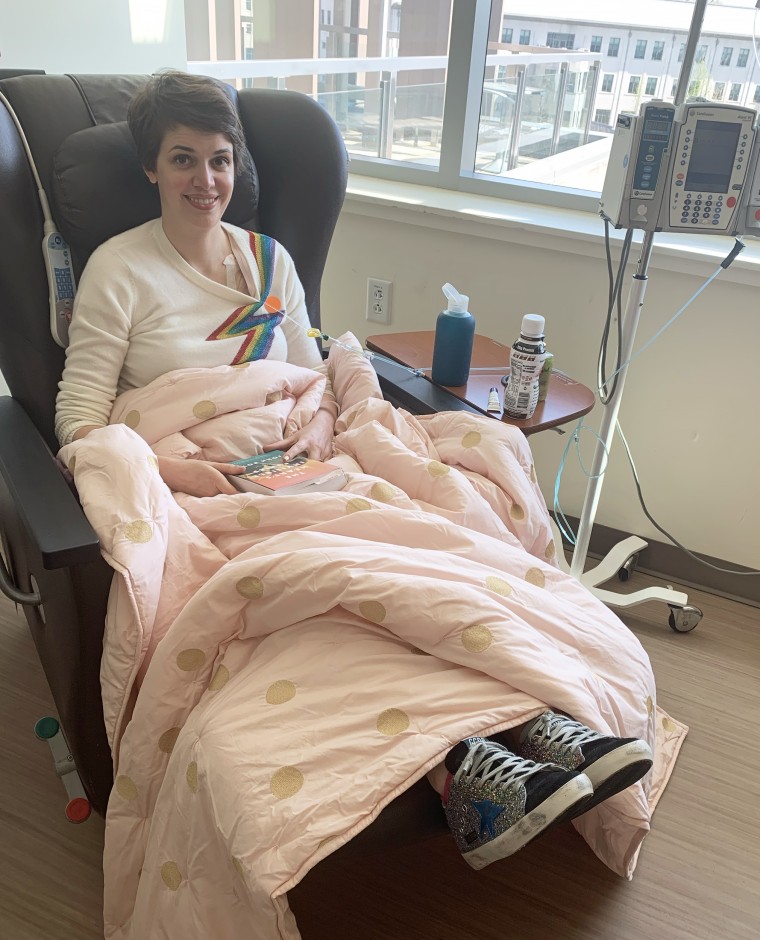It was November 2018, and I had been traveling nonstop for months. At 38, I was the owner of a 50-employee marketing firm. My company was depending on an important deal to come through, but it was in jeopardy. If I failed to save it, we might have to lay off staff. It was a horrifying thought. I was frazzled, jet-lagged and overwhelmed.
I woke up in another hotel bed at yet another conference I was attending to drum up new business and went to the bathroom as part of my normal morning routine. On this particular day, I looked in the toilet and I saw something abnormal. Could that be blood?
As a self-diagnosed hypochondriac, my first thought was cancer. A Google search calmed my nerves. There are many benign causes of blood in the toilet bowl, including hemorrhoids. So, it was probably nothing major. Yet my initial alarm also made me feel a little conflicted — should I tell someone or just ignore it? I didn’t have time for a health crisis.
While my important business deal was slipping away, the blood kept showing up. After several days, I realized I couldn’t brush it off much longer. My husband, Jesse, needed to know. Still, I was distracted by a quickly approaching meeting about another deal in San Francisco.

A few moments before the meeting started, I found myself standing in a doorway, calling Jesse. I often talked with him about my business challenges. He is a fellow business owner, and always a great sounding board for me. But this time, I realized that I was terrified — both about the meeting and the blood. Did I really need to tell him about the blood? What if it was just a hemorrhoid? Fears of being “too dramatic” were flooding my brain. Even though my husband is supportive, discussing bathroom habits wasn’t the norm in our marriage. So, saying “Sweetie, I think I saw blood in my poop this week” was a jarringly uncomfortable thing to say.
We discussed the meeting, and then I paused and took a deep breath. I gathered up courage and got the words out. Once they were said, a weight lifted off me. He didn’t respond with words of disgust or dismiss my symptoms. We decided I should meet with our family doctor when I got home, and then a specialist if necessary. But the sense of relief was quickly replaced by an ominous sense of foreboding. Verbalizing my fears made them more real. Maybe that was the reason I was afraid of saying it out loud?
At home, I got the first available appointment with my family doctor. No hemorrhoid was found. The doctor said she wasn’t worried because I was only 38 — she sent me away. But since the bleeding persisted, and wasn’t caused by a hemorrhoid, I was still concerned.
Two weeks later, it was New Year’s Eve. Jesse and I wandered the aisles of Party City to pick up costumes for a zombie-themed New Year’s party later that night. Later that afternoon, I met with a gastroenterologist. New Year’s Eve is apparently a slow day for them, so they were able to fit me in.
As I shared my symptoms, I could see concern in the doctor’s face. “You’re not too young for colon cancer,” she said. “Two months of bleeding is too long, and a dull red color in your stool is consistent with bleeding higher up in your colon.” She put me at the top of the list for a colonoscopy.
I left the appointment in no mood to celebrate. I told Jesse I didn’t feel like going to the party, and recounted the conversation with my doctor. We moved the Party City bag into the garage and spent a quiet night on the couch, worrying about what the new year might bring.
Four days later, I groggily woke from a colonoscopy. When my doctor entered the room with a solemn expression, I instantly knew the news was not good. “We found a tumor, and it’s almost certainly cancerous,” she said.
I was unsurprised and also completely floored. On one hand, I felt vindicated because I had successfully advocated for my body, but I also couldn’t believe that my worst fear was actually happening. At the time, no one was talking about the rising risks of colon cancer in young people. At 38, I was too young to qualify for a preventative colonoscopy (they’re still not recommended until age 45). I didn’t have a family history of colon cancer, but apparently neither do the majority of people diagnosed, although it is a risk factor, according to the American Cancer Society. Only later did I learn that colon cancer kills more people each year than either breast or prostate cancer, according to the Centers for Disease Control and Prevention. It was a bigger threat than I imagined.

The doctor told me it was good that I came in when I did. “If it’s not stage 4, you have a good chance of full recovery,” she said. “But treatment is going to be hard.”
For the next five days, Jesse and I waited for the test results to determine whether the cancer had spread. These were the most difficult days in the entire journey. Life seemed to be suspended as we nervously anticipated the phone call from my doctor.
Thankfully, my cancer was stage 3, and the survival odds were good. I had 10 inches of my colon surgically removed and underwent three months of grueling, high-dose chemotherapy. The treatment was intense emotionally and physically. I was so weak that a 10-minute walk sent me to bed for hours. I had months of nightmares about dying. But I survived through it all.

It’s been four years since I finished treatment, and my cancer hasn’t returned. This journey has turned my life upside down, but it also gave me a powerful sense of purpose. I brought in a new CEO to run my company so I could focus all of my energy on colon cancer prevention projects. I spoke at the White House as part of the Cancer Moonshot, an ambitious federal program to reduce cancer deaths by 50% over the next 25 years. I launched an initiative called Lead From Behind, resulting in a 36% increase in colonoscopy appointments nationwide. I never could have predicted I would spend my 40s proudly wearing a “Colonoscopy Enthusiast” T-shirt, and using my platform — and butt humor — to help prevent colon cancer in young people.
Verbalizing my bathroom experience was hard the first time I shared it with my husband, and is still a little weird every time I repeat it. But I’ve learned that it is so important to get over our fears and the stigmas when it comes to our bodies and our health. That awkward conversation that I forced myself to have with my husband led to an early and survivable diagnosis for me. But had I continued to be embarrassed, it might not have worked out that way. And I realized a simple but critical thing that keeps me talking about this today: The more awkward conversations we have now, the more people will live to talk about it later.
Do you have a personal essay to share with TODAY? Please send your ideas to TODAYEssays@nbcuni.com.